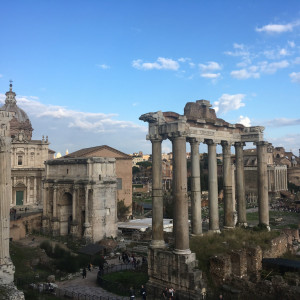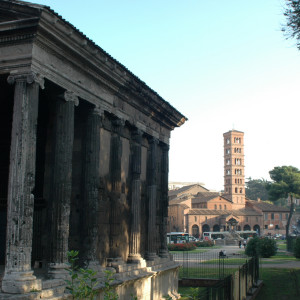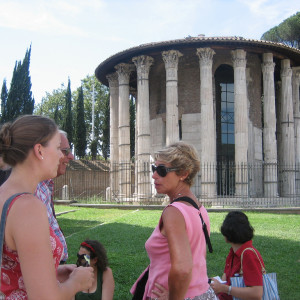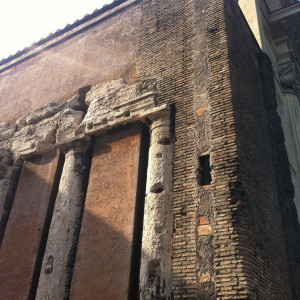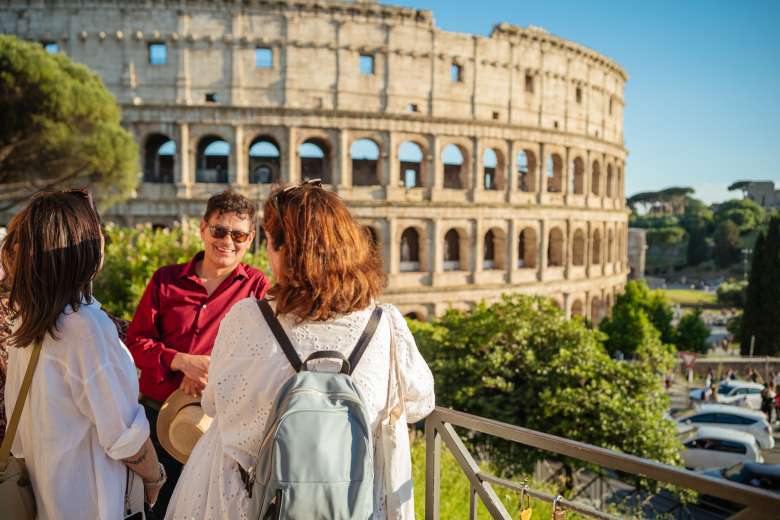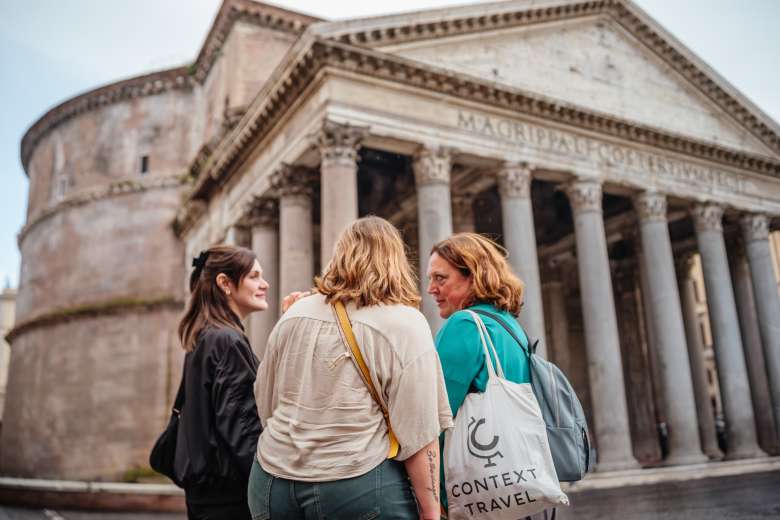Tour Details
Duration
3 hours
Product Type
Tour
Venues
- San Nicola in Carcere
- Temple of Portunus
- Temple of Hercules Victor
- Circus Maximus
Select a date
Tour Description
Forget the emperors, senators or gladiators, you didn’t come all this way just to rehash the greatest hits. This tour is about the Romans who didn’t make the history books: the bakers, shopkeepers, temple-goers, and families crossing the Tiber for trades. In what turns out to be an area not much bigger than a full NYC block, you’ll find a remarkable concentration of Ancient temples and structures, some in plain sight, others hidden within a palimpsest of historical layers.
How did the rhythms of commerce, religion, and social hierarchy shape the daily experiences of ordinary Romans? What archaeological and textual evidence can we read to reconstruct their world? These, and many more, are the questions you’ll dig into with your guide as you wander the Foro Boario (Rome’s ancient cattle market), cross over to Tiber Island, and step inside several Republican-era temples.
Your guide knows exactly where to pause, peel back the layers, and show you the city as lasagna: built one layer of history on top of another. They will contextualize each site with insights into the political, economic, and social forces at play, taking you beyond the Roman Forum, Colosseum, and other famous monuments to discover an array of lesser-known ancient ruins not normally included in a typical tourist itinerary, but all amazing, unique, and critical to understanding more about daily life in Ancient Rome.
How did the rhythms of commerce, religion, and social hierarchy shape the daily experiences of ordinary Romans? What archaeological and textual evidence can we read to reconstruct their world? These, and many more, are the questions you’ll dig into with your guide as you wander the Foro Boario (Rome’s ancient cattle market), cross over to Tiber Island, and step inside several Republican-era temples.
Your guide knows exactly where to pause, peel back the layers, and show you the city as lasagna: built one layer of history on top of another. They will contextualize each site with insights into the political, economic, and social forces at play, taking you beyond the Roman Forum, Colosseum, and other famous monuments to discover an array of lesser-known ancient ruins not normally included in a typical tourist itinerary, but all amazing, unique, and critical to understanding more about daily life in Ancient Rome.
Choose this tour if...
- You've already visited the Colosseum and the Forum, and now you're ready to go beyond the typical landmarks for an experience most visitors never know how to access.
- You’re the history geek in the group, but you want a tour that keeps everyone engaged at their own level.
- You want rich, factual stories about how Romans lived, worked and worshipped, while also learning how to read the archaeological and architectural traces left behind that reveal the rhythms of ordinary Roman life.
- You want a guide who can bring ruins to life, helping you visualize the complexity of the structures and communities that used to exist here, and connecting the dots across generations and historical eras.
Experts
Traveler Testimonials
A Hidden Side of Ancient Rome
"Our guide gave us a wonderful afternoon tour through all of the off-the-beaten-path sites of Ancient Rome that hadn’t fit into our other tours of the more typical landmarks. She adapted really well to things we had already seen, added surprises we hadn’t heard about, and gave us a full picture of what life was like in the early days of Rome."
–Ellen A.
–Ellen A.
The Past Came Alive
"Our guide was outstanding. His knowledge about the way people lived, their art, their work, their ancient religions brought the past to life. We are so glad we took this tour. It was our first of the trip and set everything up for the rest of our visit."
–Daniel B.
–Daniel B.
Like Walking Through Layers of History
"One of the best tours we've ever taken! This walk gave us a real glimpse into the physical passage of time that can be seen throughout Rome. I felt like we were experiencing a reconstruction of the ancient city and all of the changes it has undergone."
–Karen F.
–Karen F.
You’ll kick things off in the Foro Boario, Rome’s ancient cow market on the banks of the Tiber. Once the city’s commercial heartbeat, this square tells you why trade was the engine of Rome’s rise. Today, it’s surprisingly quiet, an oasis in the middle of the city, yet packed with more than fifteen temples. With worn stones under your feet and the river sliding by, your guide will introduce you to the normal life of the bakers, merchants, and worshippers who once made this district hum.
From there, you’ll step into the cool shade of Republican-era temples and pause by the Cloaca Maxima, Rome’s great drain. Sounds unglamorous, yet this two-thousand-year-old sewer might be the most important building in the city; it’s still in use today. Along the way, you’ll discover why temples mattered to daily life, how religion shaped neighborhoods, and how the city was built layer upon layer: temples hidden inside medieval churches, arches recycled into new streets, bridges rebuilt and broken again.
Finally, you’ll cross the river by the Ponte Rotto, one of the oldest bridges in the world, and finish on Tiber Island, a place with its own mix of legend and living tradition. According to Roman lore, the island was chosen by a serpent sacred to the god Aesculapius as his home, inspiring the first temple to medicine, and it remains a center of healing to this day. The exact route follows the guide’s specialty and your group’s curiosity, offering a fascinating range of sites that, together, unlock what it felt like to actually live in ancient Rome.
Sites Visited
- Foro Boario (Cow Market) – Ancient commercial hub on the Tiber
- Cloaca Maxima – The “great drain” of Rome, a two-thousand-year-old sewer still in use today.
- Ponte Rotto (“Broken Bridge”) – One of the oldest surviving bridges in the world, with layers of stories in its ruins.
- Tiber Island – The legendary island in the middle of the Tiber river.
- Temple of Portunus – Exceptionally well-preserved temple to the god of harbors, tucked right by the river.
- Temple of Hercules Victor – Striking round temple, the oldest surviving marble building in Rome.
- San Nicola in Carcere – A medieval church built directly into the remains of three Republican-era temples.
Tickets
The tour is fully prepaid, and there are no tickets to purchase in advance since most venues are free to visit. You may encounter small on-the-spot costs during the tour, such as voluntary donations for churches or minor entrance fees, so it’s a good idea to have a little local cash on hand.
Accessibility
We understand that some of our valued guests may have mobility concerns, and we want to ensure you have a comfortable and enjoyable experience throughout your tour. If there are any accessibility concerns that your tour guide will need to be aware of, please let our team know at the time of booking.
Wheelchair accessibility
This tour is mostly accessible, covering a relatively short distance. However, some areas include uneven cobbled streets and ancient sites that may be challenging for those using a cane or with limited mobility. If you have any mobility concerns, please contact us—we’d be happy to discuss adaptations to make the tour work for you.
Is this tour suitable for visitors with mobility issues?
This tour isn't very walking-intensive, but there are uneven cobbled lanes and venues. Clients who use a cane or who have difficulty walking may find this difficult. If you have any mobility issues, please contact us, and we can design a tour adapted to your concerns.
Does this tour visit sites with a dress code?
Yes, it usually visits San Nicola in the Carcere church. All churches in Rome require modest dress. Men should wear slacks, and women should wear slacks or skirts below the knee. Shoulders must also be covered. If you are intent on wearing spaghetti straps or a halter-top, bring a shawl and expect to keep it around you. Shorts above the knee are not allowed.
Is this tour good for children?
This tour is not part of our family program, which is designed specifically to engage younger learners. For a family-friendly option, we recommend our Colosseum and Roman Forum tour for families. While younger children are welcome, please note that some of the topics on this tour may be less engaging for them.
Do I need to know a lot about history or archeology to take this tour?
Not at all! This tour is designed for all levels of experience. Whether you’re a seasoned history buff or simply curious about ancient Rome, your guide will tailor the experience to be engaging and insightful for everyone.
Book with confidence — see Context's flexible cancellation policy here.
Where You'll Start
–
71 Reviews
Reviews can only be left by Context customers after they have completed a tour. For more information about our reviews, please see our FAQ.
Philip was an incredible guide -- so knowledgeable and enthusiastic. We had so much fun. Truly the greatest tour we've taken!
Jenna
Reviewed on:
Apr 11, 2025
Giulia gave us a wonderful afternoon/evening tour through all of the off the beaten path sites of Ancient Rome that had just not fit into our other tours of the typical sites. She adapted really well to things we had already visited on another tour with some surprises we hadn’t heard about and gave a full picture of what life was like in the early days of Rome. I highly recommend this tour.
Ellen
Reviewed on:
Jan 31, 2025
This tour was exactly what we were hoping for and Liz was wonderful!
Lynn
Reviewed on:
Nov 25, 2024
